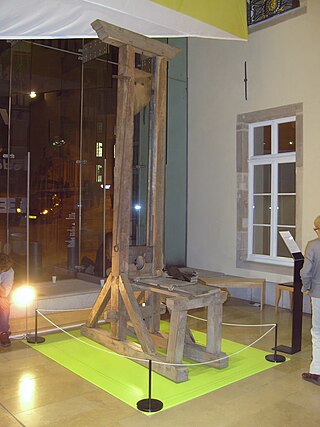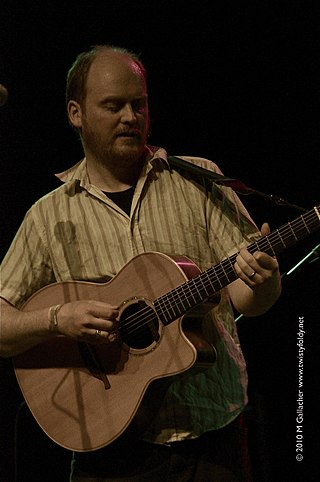External links
- Graemefife.co.uk, personal web site
Graeme Fife (born 1946) is a prolific English writer, playwright and broadcaster. His first career was as a schoolmaster and university lecturer.
Born in 1946 in St Pancras, London, Fife is the son of John Fife and his wife Muriel H. Lickorish. [1] He was educated at schools in Greater London and then at the University of Durham, where he graduated with first class in Greek language and literature. [2]
Fife taught Classics for one year at a school in Lancashire, then from 1970 to 1978 was Head of Classics at Gresham's School, Holt, [3] and later a lecturer in Greek and Roman literature at the University of Reading. [4]
In July 1999, The Independent named Fife's Tour de France: The History, the Legend, the Riders as its book of the week. [5] The Times later ranked it as one of its top five sports books of the year. [6]
Reviewing Fife's The Terror: the Shadow of the Guillotine (2003) in The Independent, William Doyle called it "The most authoritative treatment we are likely to have for many years."
Of his book Arthur the King about the Arthurian legends, Gwyn A Williams, distinguished Welsh historian and former professor of history at University College Cardiff wrote: 'Much of what Fife wrote was new to me; what wasn't was conveyed more effectively than anything else I have read. From Fife's book, in both my own book and the television series I made, I got Camelot losing its glamour after Jerusalem fell and all that valuable detail of knighthood the book delves into (usually buried in academic tomes) .If I'd been permitted footnotes, Fife would have been all over the first Section of my book.'
In 1997, Fife wrote to The Independent to correct it on the origin of the word "clitoris". [7]
As well as books, Fife has written plays, talks, and stories for BBC Radio. [8]
His novel Angel of the Assassination (2009) is a fictionalized account of the life of Charlotte Corday. [9]
This novel was rewritten and now titled No Common Assassin, available on Amazon

Captain Robert von Ranke Graves was an English poet, soldier, historical novelist and critic. His father was Alfred Perceval Graves, a celebrated Irish poet and figure in the Gaelic revival; they were both Celticists and students of Irish mythology.

A guillotine is an apparatus designed for effectively carrying out executions by beheading. The device consists of a tall, upright frame with a weighted and angled blade suspended at the top. The condemned person is secured with a pillory at the bottom of the frame, holding the position of the neck directly below the blade. The blade is then released, swiftly and forcefully decapitating the victim with a single, clean pass; the head falls into a basket or other receptacle below.

Alan Sillitoe FRSL was an English writer and one of the so-called "angry young men" of the 1950s. He disliked the label, as did most of the other writers to whom it was applied. He is best known for his debut novel Saturday Night and Sunday Morning and his early short story "The Loneliness of the Long Distance Runner", both of which were adapted into films.

John Evelyn was an English writer, landowner, gardener, courtier and minor government official, who is now best known as a diarist. He was a founding Fellow of the Royal Society.

Raymond Poulidor, nicknamed "Pou-Pou", was a French professional racing cyclist, who rode for Mercier his entire career.

A bookmobile, or mobile library, is a vehicle designed for use as a library. They have been known by many names throughout history, including traveling library, library wagon, book wagon, book truck, library-on-wheels, and book auto service. Bookmobiles expand the reach of traditional libraries by transporting books to potential readers, providing library services to people in otherwise underserved locations and/or circumstances. Bookmobile services and materials, may be customized for the locations and populations served.

Brian Robinson was an English road bicycle racer of the 1950s and early 1960s. He was the first Briton to finish the Tour de France and the first to win a Tour stage. He won the 1961 Critérium du Dauphiné Libéré stage race. His success as a professional cyclist in mainland Europe paved the way for other Britons such as Tom Simpson and Barry Hoban.

Mont Aigoual is the highest point of the Gard department, France. It is part of the Massif Central, and it is located within the Cévennes National Park. Its southern slopes are the source of the river Hérault flowing into the Mediterranean.

James Yorkston is a Scottish folk musician, singer-songwriter and author from the village of Kingsbarns, Fife. He has been releasing music since 2001. As well as recording as a solo artist, he has released music with his backing band the Athletes, as part of the Fence Collective, and as a member of the trio Yorkston/Thorne/Khan. He has also written fiction and non-fiction books.

The 1990 Tour de France was the 77th edition of the Tour de France, one of cycling's Grand Tours. It took place between 30 June and 22 July 1990. The 3,403.8 km (2,115.0 mi) race consisted of 21 stages and a prologue. American Greg LeMond (Z–Tomasso) repeated his 1989 victory in the general classification, ahead of Claudio Chiappucci and Erik Breukink (PDM–Concorde–Ultima) in second and third place respectively.

Mark Philip David Billingham is an English novelist, actor, television screenwriter and comedian known for the "Tom Thorne" crime novel series.

The 1963 Tour de France was the 50th instance of that Grand Tour. It took place between 23 June and 14 July, with 21 stages covering a distance of 4,138 km (2,571 mi). Stages 2 and 6 were both two part stages, the first half being a regular stage and the second half being a team or individual time trial.

Fanny Bullock Workman was an American geographer, cartographer, explorer, travel writer, and mountaineer, notably in the Himalayas. She was one of the first female professional mountaineers; she not only explored but also wrote about her adventures. She set several women's altitude records, published eight travel books with her husband, and championed women's rights and women's suffrage.
Hamish Brown M.B.E. FRSGS is a professional writer, lecturer and photographer specialising in mountain and outdoor topics. He is best known for his walking exploits in the Scottish Highlands, having completed multiple rounds of the Munros and being the first person to walk all the Munros in a single trip with only ferries and a bicycle as means of transport.
The 40th Edition Vuelta a España, a long-distance bicycle stage race and one of the 3 grand tours, was held from 23 April to 12 May 1985. It consisted of 19 stages covering a total of 3,474 km. The race was won by Pedro Delgado of the Orbea cycling team.
William Fotheringham is a sports writer specialising in cycling and rugby. As a newspaper journalist, he writes for The Guardian. Fotheringham was a features editor for Cycling Weekly, the features editor of Cycle Sport and co-founder of Procycling magazine. He is a current writer for procycling Magazine.
John Borland Wadley was an English journalist whose magazines and reporting opened Continental cycle racing to fans in Britain. Wadley covered 18 Tours de France from 1956. He worked for the British weekly, The Bicycle and then started and edited the monthlies Coureur and International Cycle Sport. He also wrote a number of books.
Tomás Graves is a graphic designer, printer, musician and writer. He is the son of the poet Robert Graves and Beryl Graves.

The Col de la République or Col de Grand Bois is a mountain pass in the Pilat massif within the Pilat Regional Natural Park in the Loire department of the Rhône-Alpes region in southern France. Located on the D1082 in the commune of Saint-Genest-Malifaux, it connects Saint-Étienne with Annonay in the Rhône valley. The road was constructed in 1830 and the col has an altitude of 1,161 metres.

The Machecoul massacre is one of the first events of the War in the Vendée, a revolt against mass conscription and the civil constitution of the clergy. The first massacre took place on 11 March 1793, in the provincial city of Machecoul, in the district of the lower Loire. The city was a thriving center of grain trade; most of the victims were administrators, merchants and citizens of the city.